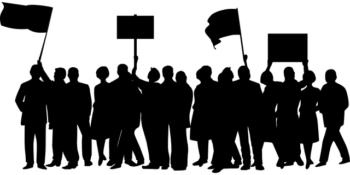The Israeli Black Flag Movement 2020 Posted by Ayana on Oct 21, 2020 in Uncategorized
Several weeks ago, before Israel entered its second lockdown, I travelled to the south, and drove back home on a Saturday evening. Departing from the small village where I’ve spend my weekend, I saw two people standing along the road waving black flags. Two more were standing at the next stop. This vision repeated itself in every intersection. As I got closer to Tel-Aviv, the size of these groups increased.
The Black Flag Protests (מְחָאַת הַדְּגָלׅים הַשְּׁחוֺרׅים) were first held on March 2020, a couple of weeks after Israel has held its third election within a period of 12 months. Israel’s president tasked the Blue and White party leader with forming a coalition. Two days later, the Parliament Speaker, a member of the Likud party, abruptly adjourned the Knesset, and announced locking the plenary until the following week. Critics claimed it is an illegal shuttering of parliament, an attempt that amounted to a political intervention during formal coalition talks.
Israel was already in lockdown under COVID-19 restrictions. Gatherings were ban. Venturing from homes for more than 100 meters was prohibited. The regulations, though, did permit Israelis to leave their homes for work, stocking up on food and medicine, receiving medical care, and attending a demonstration. So the first black flags protest was a convoy protest (שַׁיָּרַת מְחָאָה), and drivers stayed in the car. Over 100 vehicles, decorated with Israel flags and black flags, drove from Tel Aviv to Jerusalem and rallied outside the Israeli parliament. A few more convoy protests were held, but soon they moved out of their cars and into the streets. On April, amid national lockdown, thousands of Israelis braved Coronavirus fears and demonstrated in Tel-Aviv, fighting for democracy (דֶּמוֹקְרַטְיָה) and against corruption (שְׁחִיתוּת). לְאֲנָשִׁים אֵין מָה לֶאֱכוֹל אֲבָל הֵם רוֺצׅים לְהָקִים מֶמְשָׁלָה שֶׁל 34 שָׂרׅים (people have nothing to eat but they want to form a government of 34 ministers), claimed one of the speakers.
It was a unique demonstration (הַפְגָּנָה). Protesters complied with COVID-19 restrictions: all wore masks, and spots where people were allowed to stand for social distancing, were marked, as you can see in the next video:
After lockdown restrictions were lifted, large protests in front of the Prime Minister’s Official Residence on Balfour Street in Jerusalem were staged. Weekly Saturday night demonstrations were held simultaneously outside Netanyahu’s official residence and at highway overpasses throughout the country. Israelis across the political spectrum, whose numbers seem to be growing every week, demonstrate over Netanyahu’s failure to curb the spread of the pandemic; and claim that Netanyahu whose trial (מִשְׁפָּט) on three corruption charges has been delayed due the pandemic should resign (לְהׅתְפַּטֵּר). נְתַנְיָהוּ לֺא מוּדְאָג מֵהַמַּגֵּפָה, הוּא מוּדְאָג מֵהַמִּשְׁפָּט שֶׁלוֺ (Netanyahu doesn’t worry about of the pandemic, he worries over his trial), accused one of the politicians. Protests have widened from week to week, reflecting the frustration that many Israelis are feeling about the country’s situation and leadership (הַנְהָגָה). Many activists were incensed by a recording of Israel’s internal security minister, who was caught on tape pressuring a senior police official to ban demonstrations against the Prime Minister.
The Balfour protests were colorful. Protesters brought with them more than face masks and black flags. Some activists dressed up in costumes, many brought pots and spoons to make noise, and others practiced yoga in the event. Watch this video from one of the July protests:
Israel entered a second nationwide lockdown on the eve of the Jewish New Year on September 18. Under the new restrictions people are prevented from venturing more than one kilometer from their home in order to protest, and rallies are limited to groups of 20. Critics have accused the prime minister of pushing through overbearing restrictions on movement in order to clamp down on the protests. Nevertheless, protests are being held throughout neighborhoods around the country every Thursday, Tuesday, and Saturday. People demonstrate within one kilometer from their home, wearing masks, keeping two meters from each other, and waving black flags.
Text vocabulary
Demonstration = הַפְגָּנָה, demonstrations = הַפְגָּנוֺת
To demonstrate = לְהַפְגּׅין
Protest = מְחָאָה, protests = מְחָאוֺת
Black = שָׁחֹור
Flag = דֶּגֶל, flags = דְּגָלׅים
The Black Flag Protests = מְחָאַת הַדְּגָלׅים הַשְּׁחוֺרׅים
Democracy = דֶּמוֹקְרַטְיָה
Leadership = הַנְהָגָה
Government = מֶמְשָׁלָה, government = מֶמְשָׁלוֺת
Trial = מִשְׁפָּט
Corruption = שְׁחִיתוּת, corruptions = שְׁחִיתוּיוֺת
To resign = לְהׅתְפַּטֵּר
Keep Calm and Learn Hebrew!

Build vocabulary, practice pronunciation, and more with Transparent Language Online. Available anytime, anywhere, on any device.




